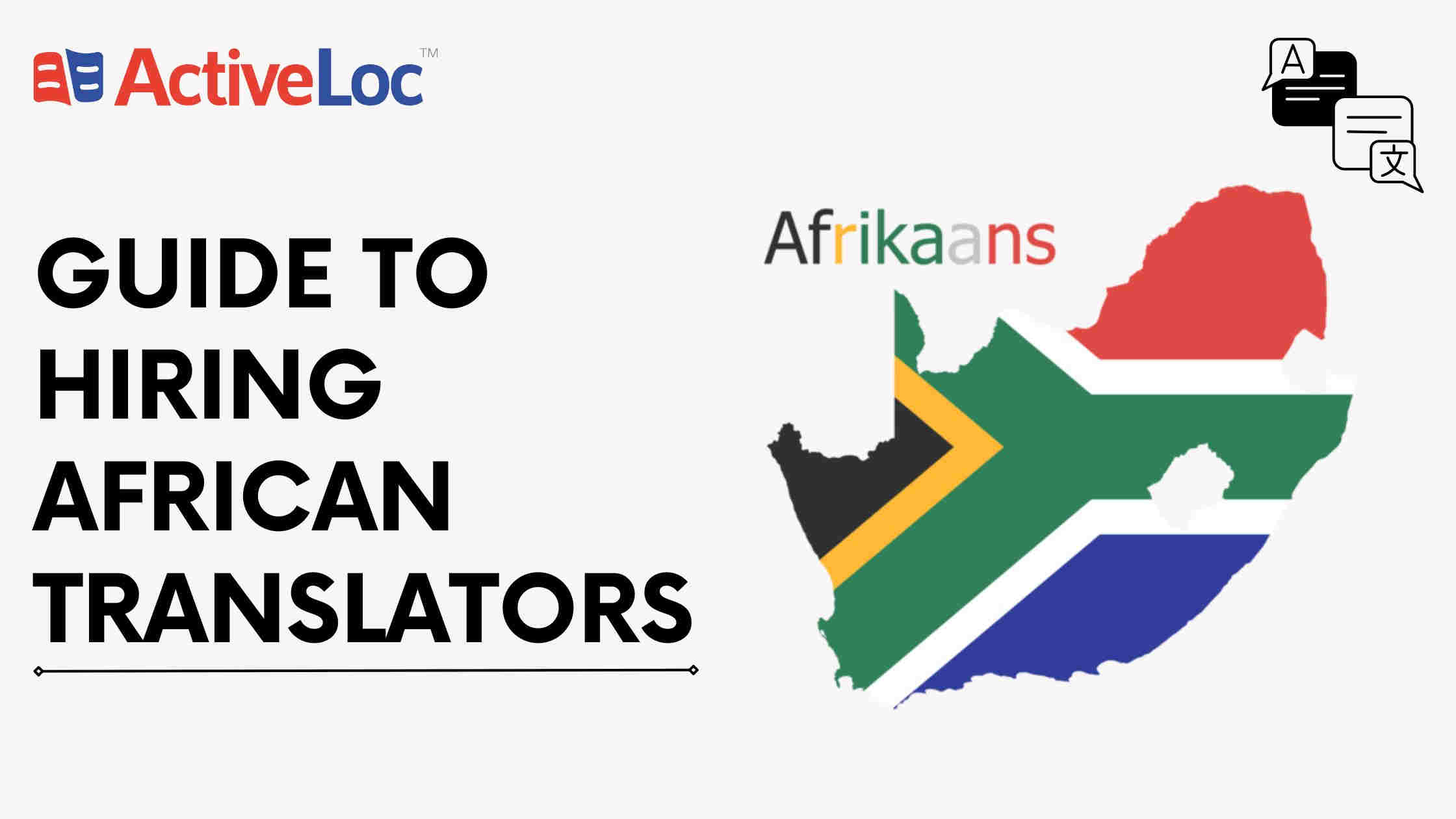This guide will make hiring an African Translator a breeze for you. Depending on your requirements, we will help you select between hiring a freelance African translator and an agency.
Whether you want to translate a small document or have large volumes of content that need translation on an ongoing basis, this article can answer all your doubts. Let’s get started.
Table of Contents
ToggleHiring the Right African Translator
The right approach will differ for individuals and organizations. For a small document that needs quick translation, hire a freelancer.

Work with an agency if you are part of an organization and want to bulk translate documents and content, including:
- Marketing material
- Business documents
- Training material
- Legal documents
- Policies
- Software
- Mobile app
- Website content
Here are some factors to consider when choosing between a freelance African translator or an agency.
Freelancer:
Factors to consider when hiring a freelance African translator:
- Cost-Effective:
Freelancers often have lower overhead costs, making their services potentially more cost-effective compared to agencies. The rates start at 5 cents/word and increase depending on the project’s complexity.
- Personalized Attention:
Working with a freelancer allows for a more direct and personalized relationship. Communication is streamlined as you have direct access to the translator.
- Specialized Expertise:
Freelancers may offer specialized expertise in industries or niche subjects, providing targeted and high-quality translations.
- Flexibility:
Freelancers often offer flexibility for working hours and project timelines, accommodating your specific needs.
- Direct Collaboration:
Direct collaboration with a freelancer can result in a more intimate understanding of your brand and requirements, leading to tailored translations.
Considerations for Freelancers:
- Availability: Freelancers may have varying availability, and ensure they can meet your project deadlines.
- Scalability: Managing multiple freelancers can be more complex than dealing with a single agency for larger projects or multiple languages.
- Quality Assurance: Quality assurance of the project relies on the individual freelancer’s processes without a team structure.
Translation Agency:
Factors to consider when hiring an Agency for African translations:
- Diverse Skillsets:
Agencies often have a pool of translators with diverse skill sets, ensuring a comprehensive approach to various projects and language pairs.
- Project Management:
Agencies provide dedicated project managers, streamlining the process and offering a single point of contact for all your translation needs.
- Quality Control:
Established agencies typically have robust quality control processes, ensuring a high standard of accuracy and consistency in translations.
- Scalability:
Agencies are well-equipped to handle large volumes of work and multilingual projects, making them suitable for businesses with extensive translation needs.
- Technology Integration:
Translation agencies often leverage advanced translation tools and technologies, enhancing efficiency and accuracy in their work.
Considerations for Agencies:
- Costs: Agencies may have higher upfront costs compared to freelancers, but the investment often reflects the comprehensive services and quality assurance provided.
- Communication Layers: Working with an agency may involve additional layers than directly interacting with a freelancer.
- Turnaround Time: While agencies are well-equipped for large projects, turnaround times may vary based on their workload and project complexity.
Key Concerns of Hiring an African Translator:
Hiring an African Translator can be a strategic move. When hiring an African translator, considering several key factors to ensure you hire the right professional for the job is crucial.
Translation agencies take care of these factors for you.
1. Language Proficiency:
Look for candidates with a strong command of the source and target languages. A proficient African translator should navigate linguistic nuances with ease.
2. Cultural Sensitivity:
Effective translation goes beyond language; it requires a deep understanding of cultural nuances. Seek candidates who demonstrate cultural sensitivity and awareness.
3. Educational Background:
While not always mandatory, a candidate with a degree or certification in translation or a related field demonstrates a commitment to their craft.
4. Experience:
Look for candidates with a track record of successful translations. Experience in your industry or a related field adds value, showcasing their ability to handle specialized content.
5. Adaptability:
Given the linguistic diversity in Africa, an adaptable translator can navigate various dialects effectively. Assess their ability to work with diverse linguistic landscapes.
6. Technological Proficiency:
In today’s digital age, familiarity with translation tools and software is beneficial. A tech-savvy translator can enhance efficiency and accuracy.
7. Portfolio and Samples:
Request a portfolio or samples of their previous translations. It allows you to evaluate the quality of their work and assess whether it aligns with your expectations.
8. References:
Reach out to previous clients or employers for references. Feedback from those who have worked with the translator can provide valuable insights into their professionalism and capabilities.
9. Time Management Skills:
Effective translation often involves tight deadlines. Assess the candidate’s time management skills and their ability to deliver high-quality work within specified timeframes.
10. Ethical Standards:
Translators often deal with sensitive information. Ensure the candidate follows ethical standards, including confidentiality and accuracy in their work.
Africa’s Top Languages
Africa is home to a vast array of languages, reflecting its rich cultural and ethnic diversity. Here are some of the most common and widely spoken African languages:
Swahili: Spoken by millions in East Africa, Swahili is the lingua franca in the region. It’s an official language in several countries, including Kenya and Tanzania.
Hausa: Predominantly spoken in West Africa, Hausa is the language of the Hausa people and serves as a common language in Nigeria, Niger, and other neighboring countries.
Yoruba: A major language in Nigeria, Yoruba is spoken by the Yoruba people and has a significant presence in West Africa.
Igbo: Another prominent Nigerian language, Igbo is spoken by the Igbo ethnic group, primarily in southeastern Nigeria.
Amharic: The official language of Ethiopia, Amharic holds a central role in the country’s cultural and historical identity.
Zulu: One of South Africa’s official languages, Zulu is spoken by a substantial portion of the population, particularly in the province of KwaZulu-Natal.
Xhosa: Also an official language in South Africa, Xhosa is spoken by the Xhosa people and is known for its distinctive click sounds.
Arabic: Widely spoken across North Africa, Arabic is the dominant language in countries like Egypt, Morocco, Algeria, Tunisia, Libya, and Sudan.
Berber languages: Various Berber languages are spoken by indigenous communities in North Africa, particularly in Morocco and Algeria.
Somali: The official language of Somalia, Somali is spoken by the Somali people in the Horn of Africa.
The Crucial Role of African Translators in Global Business and Diplomacy
Effective communication is the key to success in this interconnected world, especially in the global business and diplomacy realm.
African translators, with their linguistic expertise, play a vital role in breaking down language barriers and fostering meaningful connections between individuals and nations.
Facilitating International Trade
In the dynamic landscape of international trade, where diverse cultures converge, the role of African translators is indispensable. These language experts ensure that negotiations, contract discussions, and trade agreements proceed seamlessly by providing accurate translations.
Their proficiency in legal terminology contributes to the clarity and precision of contracts, fostering trust among the parties involved.
Enhancing Diplomatic Relations
Diplomacy demands linguistic accuracy and an acute understanding of cultural nuances and diplomatic etiquette.
African translators serve as linguistic diplomats, precisely conveying messages and maintaining the intended tone in diplomatic communications.
Beyond language, they contribute to conflict prevention and resolution, playing a crucial role in building a positive image of their nations on the global stage.
Looking to Hire an African Translator?
ActiveLoc serves large-scale enterprises with their holistic translation needs. We can handle large-scale processes end-to-end and offer a fast turnaround at competitive prices.
By assigning a handpicked African translator with a proven track record to your project, we guarantee the utmost accuracy in the translation. We will verify the translator’s background, manage deadlines, ensure adherence to your brand guidelines, and let you scale the project up and down as needed.
We can translate documents, websites, software, and mobile apps. Tell us about your requirements and get a free quote.
